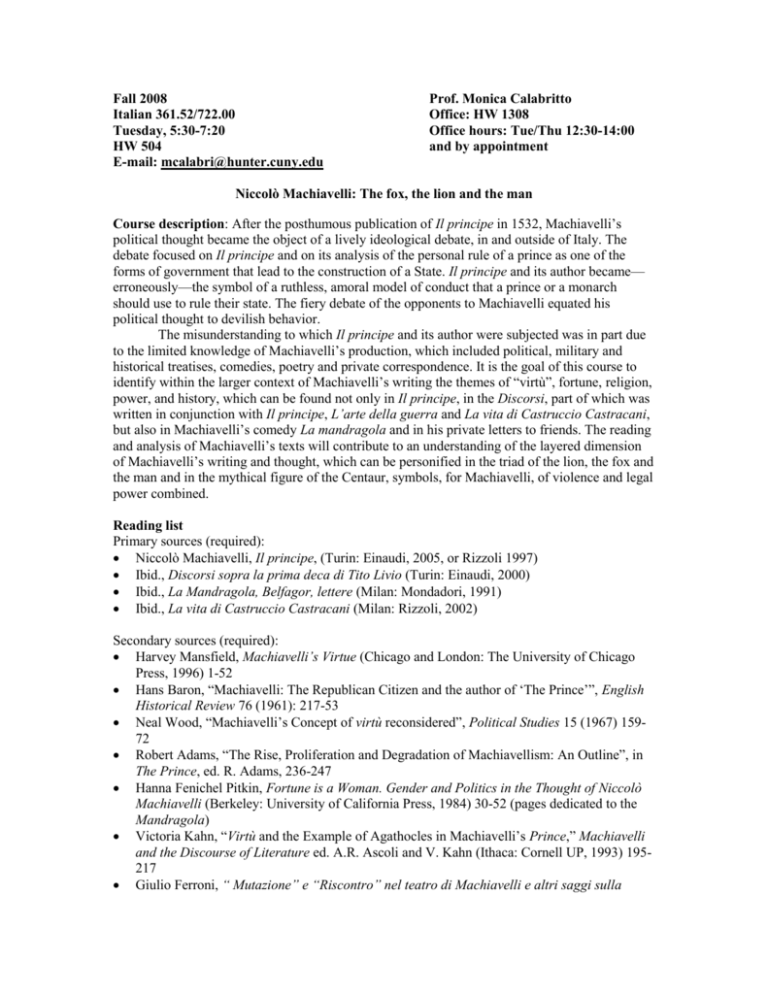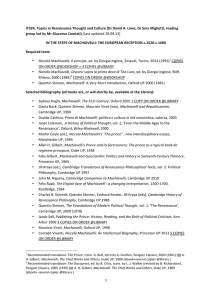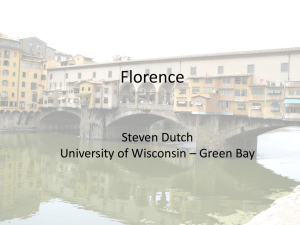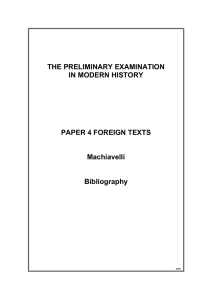Machiavelli - Hunter College
advertisement

Fall 2008 Italian 361.52/722.00 Tuesday, 5:30-7:20 HW 504 E-mail: mcalabri@hunter.cuny.edu Prof. Monica Calabritto Office: HW 1308 Office hours: Tue/Thu 12:30-14:00 and by appointment Niccolò Machiavelli: The fox, the lion and the man Course description: After the posthumous publication of Il principe in 1532, Machiavelli’s political thought became the object of a lively ideological debate, in and outside of Italy. The debate focused on Il principe and on its analysis of the personal rule of a prince as one of the forms of government that lead to the construction of a State. Il principe and its author became— erroneously—the symbol of a ruthless, amoral model of conduct that a prince or a monarch should use to rule their state. The fiery debate of the opponents to Machiavelli equated his political thought to devilish behavior. The misunderstanding to which Il principe and its author were subjected was in part due to the limited knowledge of Machiavelli’s production, which included political, military and historical treatises, comedies, poetry and private correspondence. It is the goal of this course to identify within the larger context of Machiavelli’s writing the themes of “virtù”, fortune, religion, power, and history, which can be found not only in Il principe, in the Discorsi, part of which was written in conjunction with Il principe, L’arte della guerra and La vita di Castruccio Castracani, but also in Machiavelli’s comedy La mandragola and in his private letters to friends. The reading and analysis of Machiavelli’s texts will contribute to an understanding of the layered dimension of Machiavelli’s writing and thought, which can be personified in the triad of the lion, the fox and the man and in the mythical figure of the Centaur, symbols, for Machiavelli, of violence and legal power combined. Reading list Primary sources (required): Niccolò Machiavelli, Il principe, (Turin: Einaudi, 2005, or Rizzoli 1997) Ibid., Discorsi sopra la prima deca di Tito Livio (Turin: Einaudi, 2000) Ibid., La Mandragola, Belfagor, lettere (Milan: Mondadori, 1991) Ibid., La vita di Castruccio Castracani (Milan: Rizzoli, 2002) Secondary sources (required): Harvey Mansfield, Machiavelli’s Virtue (Chicago and London: The University of Chicago Press, 1996) 1-52 Hans Baron, “Machiavelli: The Republican Citizen and the author of ‘The Prince’”, English Historical Review 76 (1961): 217-53 Neal Wood, “Machiavelli’s Concept of virtù reconsidered”, Political Studies 15 (1967) 15972 Robert Adams, “The Rise, Proliferation and Degradation of Machiavellism: An Outline”, in The Prince, ed. R. Adams, 236-247 Hanna Fenichel Pitkin, Fortune is a Woman. Gender and Politics in the Thought of Niccolò Machiavelli (Berkeley: University of California Press, 1984) 30-52 (pages dedicated to the Mandragola) Victoria Kahn, “Virtù and the Example of Agathocles in Machiavelli’s Prince,” Machiavelli and the Discourse of Literature ed. A.R. Ascoli and V. Kahn (Ithaca: Cornell UP, 1993) 195217 Giulio Ferroni, “ Mutazione” e “Riscontro” nel teatro di Machiavelli e altri saggi sulla commedia del Cinquecento (Rome: Bulzoni, 1972) Ibid., Machiavelli, o dell'incertezza (Donzelli, 2003) Il teatro di Machiavelli, a cura di G. Barbarisi e A. M.Cabrini (Cisalpino, 2005) Ibid., Machiavelli e gli storici antichi. Osservazioni su alcuni luoghi dei «Discorsi sopra la prima deca di Tito Livio» (Salerno, 1998) Giorgio Inglese, Per Machiavelli. L’arte dello stato, la cognizione delle storie (Rome: Carocci, 2007) Nicolai Rubinstein, “Machiavelli and the Florentine republican experience” in Machiavelli and Republicanism, ed. G. Bock, Q. Skinner, M. Viroli (Cambridge: Cambridge UP, 1999) 316 Davide Canfora, Prima di Machiavelli. Politica e cultura in età umanistica (Rome; Bari: Laterza, 2005) Luca D’Ascia, Machiavelli e i suoi interpreti (Bologna: Pendragon, 2006) Recommended reading (primary and secondary sources): James B. Atkinson and David Sices, eds., Machiavelli and His Friends. Their Personal Correspondence, tr. J.B. Atkinson and D. Sices (DeKalb: Northen Illinois UP, 1996) Sebastian De Grazia, Machiavelli in Hell (Princeton: Princeton UP, 1989) Giuliano Procacci, Machiavelli nella cultura europea dell’età moderna (Bari: Laterza, 1995) Vickie B. Sullivan, The Comedy and the Tragedy of Machiavelli. Essays on the Literary Works (New Haven: Yale UP, 2000) J.G.A Pocock, The Machiavellian Moment. Florentine Political Thought and the Atlantic Republican Tradition (Princeton: Princeton UP, 1975) A.R. Ascoli and V. Kahn, eds., Machiavelli and the Discourse of Literature (Ithaca: Cornell UP, 1993) Federico Chabod, “Machiavelli’s Method and Style,” The Prince, ed. R. Adams (New York: Norton & Company, 1992) 178-193 [originally published in Machiavelli and the Renaissance, by F. Chabod, tr, D. Moore Harvard UP 1958] Mario Martelli, Saggio sul Principe (Salerno, 1999) Quentin Skinner, “Political philosophy,” The Cambridge History of Renaissance Philosophy (Cambridge: Cambridge UP, 1988) 389-452 J.R. Hale, “The setting of The Prince: 1513-1514,” in The Prince, ed. R. Adams 139-149 [originally published in Machiavelli and Renaissance Italy, London: English Universities Press, 1961, chapter 7] Participation and attendance: Students can miss only 1 class. If you make more than 1 absence, I require you to schedule an appointment with me, otherwise your grade will be lowered of half letter. Late work is graded down similarly. Course format: The course will be conducted as a seminar and will be in Italian. Each student is expected to come to class ready to discuss the assignment and to participate in class discussion. MA students will write a 13-15 page final paper, while undergraduate students will write a 8-10 page final paper. MA students will be required to give a 15-minute presentation on a subject that will be discussed in class. The final essay will be a comparative analysis of two texts read and discussed in class. In order to facilitate the work required in the final paper, the students will be asked to write 2 short textual analyses of passages extracted from the weekly reading assignments. These analyses need to be 1/2 -page long, typewritten, double-spaced and will be graded (- or +). I do not accept handwritten assignments. Beginning in the third week of class students will discuss with me the topic of their final essay. I will provide you with a list of possible themes for the final paper. On the ninth week of class they will hand a first submission. There will be a mid-term and a final exam. The day of the final exam, the students will hand in the final submission of the paper. Statement on academic integrity: “Hunter College regards acts of academic dishonesty (e.g., plagiarism, cheating on examinations, obtaining unfair advantage, and falsification of records and official documents) as serious offenses against the values of intellectual honesty. The College is committed to enforcing the CUNY Policy on Academic Integrity and will pursue cases of academic dishonesty according to the Hunter College Academic Integrity procedures.” Should a paper turn out to be the result of plagiarism, the grade for the assignment will be zero and the event will be reported to the Dean of Students of Hunter College. Method of evaluation: Class Participation 15 % Paper (including outline and draft) 30% Short analyses (2) 20% Midterm 15% Final Exam 20% Schedule of classes (subject to change) September 2 September 9 September 16 September 23 September 30 October 7 October 14 October 21 October 28 November 4 November 18 November 25 December 2 December 9 December16 December 23 Introduction. Main themes of the course and methodology Lettere (69-98); Il principe, lettera dedicatoria + first seven chapters; Luca D’Ascia, Machiavelli e i suoi interpreti, pp. 11-38; Giorgio Inglese, Per Machiavelli, pp. 11-52 Il principe, chapters VIII-XIV; Victoria Kahn, “Virtù and the Example of Agathocles in Machiavelli’s Prince”; Nicolai Rubinstein, “Machiavelli and the Florentine republican experience” in Machiavelli and Republicanism, ed. G. Bock, Q. Skinner, M. Viroli. First textual analysis due Il principe, chapters XV-XIX; Neal Wood, “Machiavelli’s Concept of virtù reconsidered”, Harvey Mansfield, Machiavelli’s Virtue, 1-52. No class scheduled Il principe, chapters XX-XXVI; Giulio Ferroni, Machiavelli o dell’incertezza Classes follow a Monday schedule Discorsi. Introduction. Historical and philosophical background. Book 1, chapters 1-10; Davide Canfora, Prima di Machiavelli. Politica e cultura in età umanistica (Rome; Bari: Laterza, 2005) 5-79 Discorsi, Book 1, chapters 11-18; Mario Martelli, Machiavelli e gli storici antichi 7-24 Mid term exam Discorsi, Book 1, chapter 58-60; Book 2, preface + chapters 15-20, 27-32; Martelli, 48-56; 92-98; 107-121 First draft + outline due Discorsi, Book 3, chapters 1-2; 9; 16-22; 26-27; 31; 4044. Martelli, 121-22; 160-176; 181-83; 188-90; 206-208 La vita di Castruccio Castracani. Robert Adams, “The Rise, Proliferation and Degradation of Machiavellism: An Outline”, in The Prince, ed. R. Adams, 236-247 Second textual analysis due La Mandragola, prologo + first and second act; Hanna Fenichel Pitkin, Fortune is a Woman. Gender and Politics in the Thought of Niccolò Machiavelli, pp. 2551; Letters (99-107) La Mandragola, third-fifth act; Giulio Ferroni, “Mutazione” e “Riscontro” nel teatro di Machiavelli e altri saggi sulla commedia del Cinquecento pp. 17-137 Final paper due Final exam 5:30/7:20


